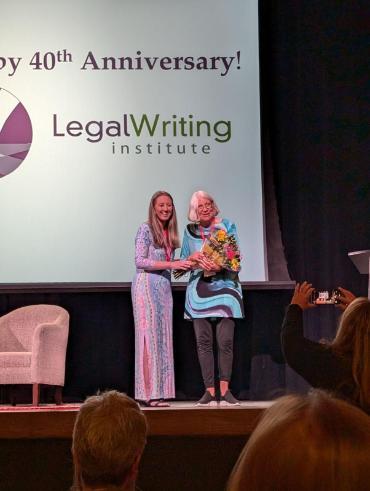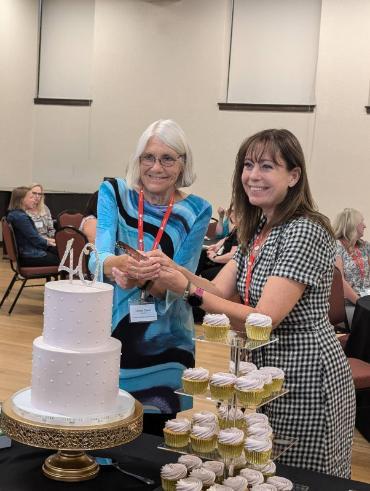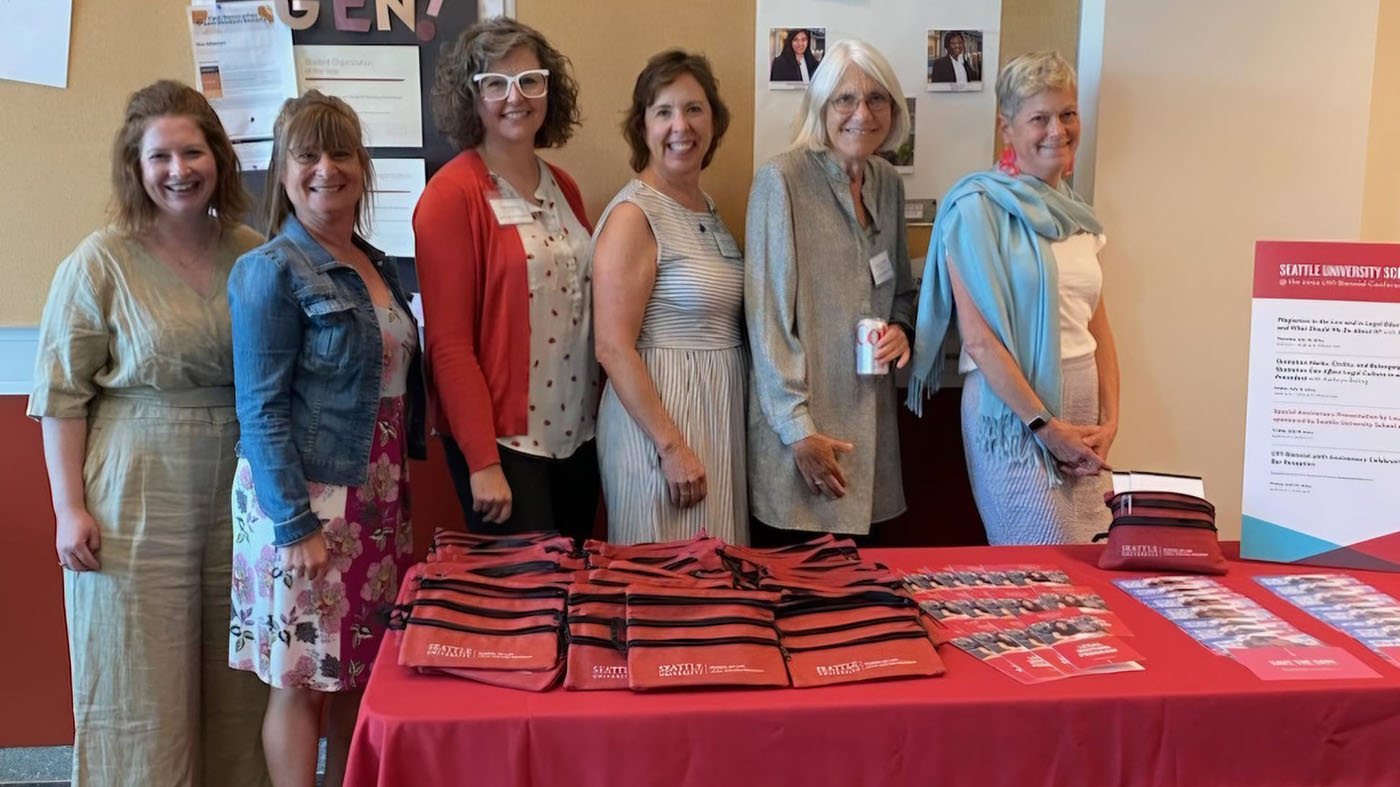Well-received presentations – include one that drew a standing ovation – and engagement with the national legal writing community marked the experience of faculty from Seattle University School of Law’s top-ranked Legal Writing Program who attended the 2024 Biennial Conference of the Legal Writing Institute (LWI), held in July at Indiana University’s Robert H. McKinney School of Law.
The contingent included Professors Kathryn Boling, who just started her position as program director, Erin Carr, Janet Dickson, Laurel Oates (emerita), Mimi Samuel, and Stephanie Wilson. Seattle U Law served as a diamond sponsor of the conference.

As one of its founders, Professor Laurel Oates (right) gave a presentation to a packed audience that drew a standing ovation celebrating her contributions to the legal writing discipline.
With a theme of “The Best is Yet to Come,” Boling said, “the conference was a great opportunity to consider what we learned about teaching during the pandemic, how we can sustain enthusiasm in the face of challenges like burnout and fatigue, and how we can continue to foster diversity and belonging.”
To mark the 40th anniversary of LWI’s annual conference, Professor Emerita Laurel Oates delivered a presentation about the roles that she and fellow Professor Emeritus J. Christopher Rideout played in its creation as young faculty members at what was then the University of Puget Sound School of Law (which was later acquired by Seattle University and renamed).
When Oates and Rideout organized the first conference in 1984, legal writing was still a nascent discipline within the curricula of most law schools. They sought to build a network of legal writing educators to develop and share best practices that would ultimately benefit law students. The initial conference drew an attendance of 80 people, which was an enormous success in the days before email, websites, and listservs.
“It was a challenge even finding faculty members who taught legal writing at that time,” Oates said.
“Our dean at the time allowed us to use some leftover money from a grant to fund the inaugural conference. He even considered making us sign an agreement that if we lost money, it would come out of our paychecks,” Oates recalled. Thankfully, that wasn’t necessary.
Their vision and groundwork created the foundation for the Legal Writing Institute to ultimately grow into a large, national organization, and since then, legal writing education has evolved into a distinct and well-respected field of legal education.
“The conference audience was captivated by Laurel’s honest and humorous presentation, which offered young legal writing professors valuable insights into the origins of the field and more senior members of the academy a nostalgic ride down memory lane,” Dickson said.
Following her poignant presentation, Oates received a standing ovation from attendees recognizing the significance of her contribution as one of LWI’s founders.
“What I love about Laurel’s description of those early years is how they promoted inclusion, belonging, civility, sharing, and a sense of community,” Boling said. “Still to this day, there is a culture of sharing, with a strong focus on students.”

At a 40th anniversary reception organized by Seattle U Law, a conference diamond sponsor, Professor Laurel Oates cuts a cake with LWI immediate past president Susie Salmon, professor and director of Legal Writing at the University of Arizona James E. Rogers College of Law.
At a 40th anniversary reception organized by Seattle U Law, a conference diamond sponsor, Professor Laurel Oates cuts a cake with LWI immediate past president Susie Salmon, professor and director of Legal Writing at the University of Arizona James E. Rogers College of Law.
Boling also presented at the conference. She first convened a discussion group on the topic of plagiarism in legal practice and in legal education, which included law school faculty who have published scholarship on the topic.
“It was well attended and provided good practical but also principled thinking,” Boling said.
Boling then delivered a presentation about a scholarly paper on which she is currently working.
“The argument I’m making is that using indirect quotation is not always the best choice, but it is a valid choice,” she said. “There was a useful crossover with the plagiarism discussion.”
Traveling to national conferences provides opportunities to benchmark Seattle U Law’s Legal Writing Program against programs from other law schools, Boling said.
“I feel grateful for some of the facets of our program that may not be new, but they are unique. For example, we do not grade students on a curve in our classes, when most every other program does,” Boling said. “We want to be able to give students a true assessment so they know where to direct their efforts in order to improve.”
Another element that sets the law school’s program apart is a focus on objective writing, where students learn to develop skills to realistically assess the chance of success for a given case.
“In our program, we have our students practice this type of writing five times over the course of a year, whereas most other law schools only do so two times,” Boling said.
Legal Writing faculty also staffed an informational table with program brochures and free Seattle U Law items as a way to engage with conference attendees and communicate the program’s strengths.

